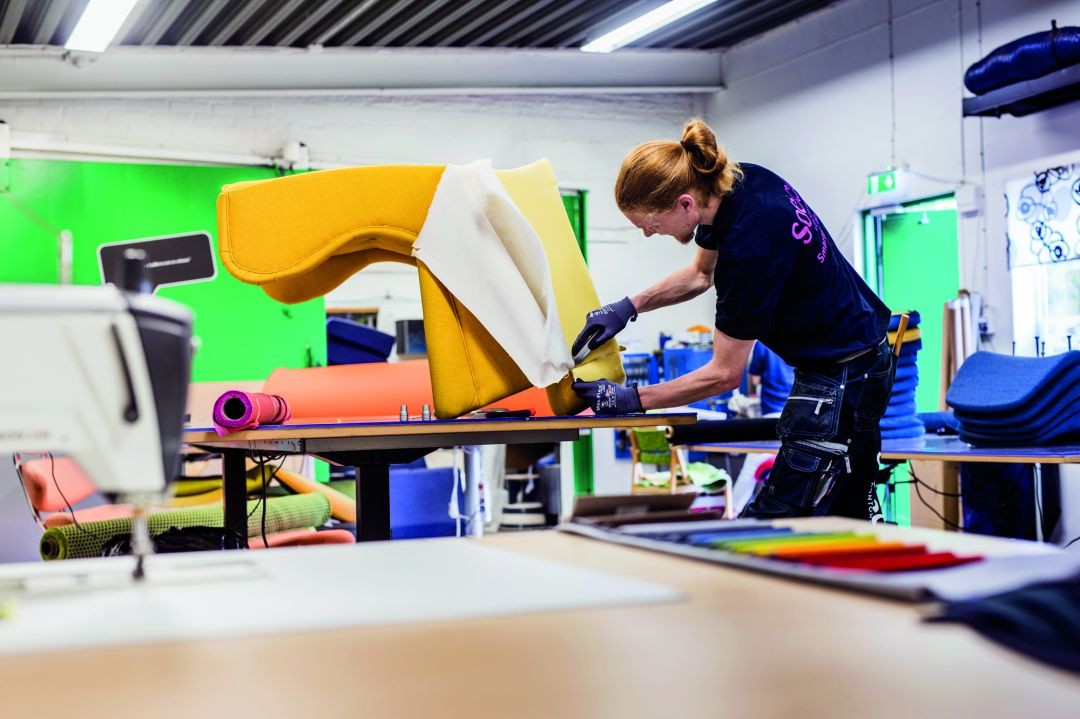
By Equipe de Redação
Posted in November 3, 2022

Ambipar understands that the role of the final consumer is key in a circular economy in which waste is kept to a minimum.
The concept of green innovation, presented by AMANHÃ more than a decade ago, has become even more relevant with the worsening of climate change and the affirmation of an ESG agenda.
In mid-April, the environmental management company Ambipar announced the creation of Universo, an enterprise designed to be a kind of showroom for sustainable business. The idea is to sell products for daily use developed with recycled materials from waste from Ambipar’s client industries. It will also use materials originating from its post-consumer operation, as in the photo to the side. The new company’s product line, which received an initial investment of just over R$ 2 million, is extensive. It includes recycled aluminum and PET plastic lighting fixtures, shampoo and conditioner made from collagen leftovers from the pharmaceutical industry and “eco-alcohol” made from sugar, corn and rice waste, for example. In its textile line, Universo seeks to show the possibilities of manufacturing fabrics from the use of sustainable raw materials, such as fabrics made from banana skins, corn starch and biodegradable plastic.
In the words of the executive director Vinícius Campion, Ambipar understands that the role of the final consumer is the key in a circular economy in which waste is as little as possible. Universo would have been created with the purpose of offering more conscious consumption options for household and everyday items. “In this way, we are here to help complete the circular economy circuit with attractive products with a high level design, which capture the preference of consumers”, says Vinícius. In addition to innovating in the very design of the business, the company also works to deliver highly disruptive products. “We are already working with 3-D modeling and 3-D printing of objects with corn starch fiber. The innovation of production processes and the use of waste as a raw material is a necessity for us to advance in the circular economy theme”, sustains the executive.
The case that opens this report reveals that the concept of Greennovation, anticipated by AMANHÃ twelve years ago, not only became a reality, but also solidified and proves to be vital for business. Even more so in the face of constant warnings from international organizations concerned about the consequences of climate change and its impacts on the future of the planet. In the book Greenovate! – Companies Innovating to Create a More Sustainable World, written by Hitendra Patel, Tyler McNally and Ronald Jonash, who was the cover of TOMORROW in June 2010, the term is defined as anything that creates and captures value by meeting the needs of the present without compromise the ability of future generations to meet their own needs. “Sustainability has gone from desirable to mandatory status. The theme addressed in Greenovate was focused on innovations related to what until then was a macro trend and today is already a reality with every global movement in ESG practices”, states Patel when reflecting on the teachings of the book more than a decade later. “Looking at one of our global programs, Innovation Olympics, we see a growing concern for generating social and environmental values in innovation solutions,” he reveals. The expert’s perception is unanimous among the academics and managers interviewed for this report.
For Luciana Hashiba, who is dedicated to education for innovation at FGV EAESP, companies in Brazil have been paying more attention to Greennovate for some time now. She, who specializes in operations management and competitiveness in the areas of collaboration and performance, innovation and sustainability, has been especially noticing two ways that organizations have found to do so. “One of the ways is to remedy what is already done, by reducing the environmental impact of what already exists. Another is to start developing innovation starting from these principles, which is a little rarer”, she says. “There are already companies doing this and others will have to understand and start designing products and services concerned with sustainability”, defends Luciana.
Another incentive is directly related to cash. BlackRock, the world’s largest asset manager, with a record $10 trillion under management, as of 2020 puts sustainability at the heart of its investment strategy. And as of this year, anyone investing in company funds will be informed of the impact of their portfolio on the planet’s climate. “More and more funds or even banks in granting credit, for example, will look with a magnifying glass on some criteria for investing in innovative companies. One of them is to have ESG practices proven by metrics”, predicts Philippe Figueiredo, analyst at Sebrae Nacional’s innovation unit. In Figueiredo’s view, the innovative process must also encompass the Social and Governance aspects, in addition to Environmental, which form the well-known acronym in English. “When faced with an innovative cell phone on the market, consumers will ask if it really has less impact on the environment, how ethical the manufacturer is in its relations with society, if the company’s board takes diversity into account, etcetera” , enumerates.
According to the study The Evolution of ESG in Brazil, carried out by the Global Compact in partnership with Stilingue, ESG investments are at the heart of the strategy of the largest financial institutions for the next three to five years. In addition, both Millennials (born between 1981 and 1995) and members of Generation Z (until 2010) show a strong interest in sustainable investments. In recent years, 78% of Millennials and 84% of Zs have declared opting for this type of application. “In this sense, the clamor comes from a greater perception of the positioning and responsibility of companies regarding problems that affect everyday life, such as climate change, diversity and inclusion, support for victims of war, or mobilization for the fight against the pandemic”, notes Fabrício Luz Lopes, executive technology and innovation manager of the Fiep System, in Paraná. “What stands out is the growing search for companies capable of generating value based on a purpose that makes sense for their chain, which is only possible with innovation and sustainability as guidelines”, he diagnoses.
That’s what André Pereira de Carvalho, a researcher at the Center for Sustainability Studies at FGV, also thinks. Specialized in the areas of public policies for sustainable development and sustainability and innovation, he preaches a minimum concept for a given product or service to be considered innovative. “If innovating is doing better, and I believe that, it is crucial to take into account environmental and social aspects”, he opines. “When any innovation delivers a better result, but with a negative effect from the point of view of impacts on the biosphere, shouldn’t we also take this negative aspect into account?”, he asks. Carvalho uses the example of mobility in large urban centers to support his reasoning. SUVs, which are usually large in size, in addition to a spacious interior, are inefficient from the point of view of sustainability since they use fossil fuel, are heavy and used to carry, on average, a person weighing 70 kilos from one point to another. “Of course, there is a marketing component of innovation, but is a city with more SUVs really sustainable?”, he points out.
Car rental company Movida has focused on sustainability as a business model. The company offers electric cars in its fleet, which is currently the largest of 100% electrified passenger vehicles in the country (about 800 cars). “We believe that the electric car is, and will be, the focal point of the urban mobility revolution. Our goal is to electrify the fleet by 20% by 2030 and reduce the emission of greenhouse gases by 30%”, announces Renato Franklin, CEO of Movida. To make the business viable, the brand opened in São Paulo, in December last year, the first store aimed at the electric mobility ecosystem, where fast and ultra-fast chargers are made available to customers. “One of the next steps is to expand the fleet of hybrid and electric vehicles and charger facilities to the south of the country”, he anticipates. Another project that meets sustainable solutions is Movida Cargo, a utility vehicle rental service for companies that also has an electric fleet. The objective is to promote cultural change in society, seeing mobility as a part of a collaborative economy and as an instrument of social inclusion, contributing to the generation of jobs. Movida defends that all innovation must also be associated with sustainability. In this sense, the company implemented fully digital processes reducing waste generation. The removal of the vehicle at the store started to be done through the opening of contracts through the tablet, a resource currently available in all units of the brand. The result could not have been better: last year, more than 70% of the company’s revenue came from processes initiated in the digital environment.
Companies are gradually adding sustainability components to their products. Recently, Ambev announced that Guaraná Antarctica is the first soft drink in Brazil to have its entire bottle production with 100% recycled PET. Colorado beer launched the first fully recycled glass bottle, on an industrial scale, as 100% of the content used to produce the packaging goes through the recycling process. That is, every bottle of this product has been a bottle before. This feat is pioneering due to the complexity of the process. This was the first bottle to use 100% broken glass for its production (traditional bottles have an average of 50% recycled material).
Nestlé is another company that has also made progress in this regard. The brand replaced all plastic drink straws with paper alternatives, removed the external plastic film from the Especialidades chocolates box, created a packaging for Nescau Orgânico that dispenses with the use of plastic lids and also launched a Mucilon brand sachet packaging with less plastic in composition and fully designed to be recycled. “All of them are solutions that require investments in technologies that range from redesigning packaging to adjusting production processes and equipment at the factory,” says Barbara Sapunar, communication and sustainability director at Nestlé Brazil. The Swiss multinational is committed to reducing and eliminating waste in the packaging chain and is intensifying its actions to make 100% of its packaging recyclable or reusable by 2025 – today, 97% of packaging is designed to be recycled or reused. : when dealing with food, the company is also able to give “green” pinches to the portfolio. In the last two years, the brand has constantly invested in plant-based innovations. Nescafé Dolce Gusto capsules, for example, have gained vegetable versions. Also in 2021, Kitkat brought its Vegan version to the market, the brand’s first vegan-certified release in a version with plant-based ingredients and produced with 100% sustainable cocoa.

Planting “innovability”
Sometimes, being within an industrial chain that is naturally in contact with the environment facilitates the connection with innovation. This is the case of Suzano, considered a reference by the analysts interviewed by AMANHÃ. Since the creation of Suzano S/A in 2019, as a result of the merger of Suzano Papel e Celulose with Fibria, the company that was born as the world’s largest pulp producer adopted the term “innovability” which, according to the company itself, means “ innovation at the service of sustainability”, as recalls Cesar Bonine, Suzano’s executive R&D manager. “When we analyzed the megatrends and the vocation and role that Suzano had and has for the planet and for the more than 2 billion people served daily with our products, we realize the importance of innovation and its direct link with sustainability”, he says. he. “Considering the nature of the business, the planted tree, we understand that innovation and sustainability are fully connected”, he adds. An example of this are the products that align concepts of rational use of resources, such as water in industry and forestry, environmental conservation, biological control of pests and diseases, among other practical actions that the company defines as sustainable intensification. “This allows us to maximize production, natural resources and make them available for other uses”, explains Bonine. More recently, with the demand to replace plastic with more sustainable solutions, the company started a new product development cycle for this purpose, paper cups and straws and a line of flexible packaging, both for the cosmetics industry and for the of food. These new developments are in line with the long-term commitment to offer 10 million tonnes of products from renewable sources, by 2030, to replace plastics and petroleum products.
Ikea, a global furniture and decoration brand, has made use of the reuse of materials, among other practices linked to the concept of circular economy, to fulfill its mission of offering affordable design to the majority of people around the world. In April, Ikea launched a campaign in Europe whose motto is to make use of second-hand objects, with the aim of encouraging customers to find a sustainable solution for furniture that they no longer need, or that needs some repair. The initiative highlights the brand’s circularity services available throughout the year. One of them is the circular area, which allows the customer to save on price and reduce waste when buying second-hand items. Another service is the second life program, through which used Ikea furniture can be resold by the customer, who receives a refund card, as well as the free hardware service in the store. “We want to create a greater reflection on the dynamics of buying and selling, promoting more environmentally friendly behaviors by prolonging the life of furniture we have at home, giving them a second life, or finding the best solution for our customers”, he says. in a note to TOMORROW Mónica Sousa, marketing manager at Ikea in Portugal.
Practicing Greenovation is not just for the big ones. Two companies from Paraná show that it is indeed possible to unite the concepts of sustainability and innovation, regardless of size. Beckhauser Equipamentos Pecuários, from Maringá, adopted solutions that won it, last year, first place in the micro and small industry category of the Sesi ODS Award. In addition to the effluent treatment station, the industry implemented a water reuse system and tanks to capture rainwater. Depending on the flow of rain, the system allows for savings of almost 600,000 liters of water per year. “It is an innovation in the production process that generates environmental and economic sustainability”, says Fabrício Luz Lopes, executive manager of technology and innovation at the Fiep System.
Tecnotam, a medium-sized industrial packaging manufacturer based in Balsa Nova, is another example. Its trump card is having developed Be Back, an integrated platform that makes it possible to control the entire packaging life cycle: product filling (producer), use by the customer (consumer), collection and recovery of empty packaging (recovery) and its return to the producer. . In the last three years, more than 50,000 packages have passed through the reverse logistics cycle, avoiding irregular disposal and potential contamination of soil and water.
Among startups, sustainability is an inseparable element of innovation efforts. Created in 2018, Athena Agro, based in Cacique Doble (RS), develops solutions for pest identification through artificial intelligence. To improve the technology, it is currently looking for angel investors – as the large companies and clients that have entered into partnerships with startups for the development of the project are known. “Sustainability is one of Athena’s pillars. It is the fundamental basis, especially in the agribusiness sector”, attests Felipe Consalter, one of the founders and CEO of the company. neural networks capable of identifying pests through images that use the cell phone’s own camera. When identifying the pest, the producer receives recommendations on how to fight it. At the same time, the contracting company gains access to a map of pest incidence in the region, being able to create a more efficient plan to reduce production costs and with pesticides that are less harmful to the environment.
Imbued with this same vision, another startup, Data Ocean, founded in 2020 in São Paulo, has been making great strides in its mission to develop a data platform to simplify the management of carriers, allowing them to reduce costs and gain efficiency. One of its founders, Marcos Antonio Amorim Filho, sees a long perspective ahead. “The transport sector is one of the main emitters of carbon dioxide in the country. His inefficiency is gigantic. On average, 40% of transport runs with empty trucks, simply because of logistical inefficiencies”, he points out. “As we have access to all the data, we calculate what the emission is and connect it with carbon credit companies, so that the carriers neutralize the CO₂ there”, he says. In summary, Data Ocean collaborates in two ways to increase the sector’s sustainability: by enabling carbon offsetting and, on the other hand, by bringing more operational intelligence. “Allowing more route intelligence, we reduce the number of vehicles transporting in an unnecessary and inefficient way”. Created in 2020, the startup has already gone through an acceleration process, in which a percentage is given in exchange for investment and training of entrepreneurs, in addition to receiving a venture capital contribution from Silicon Valley. One more proof that innovating with an eye on preserving the planet brings excellent results. Now all that remains is to ask when your business will also be Greenovate.
This content is part of the 340th edition of AMANHÃ magazine, a publication of the AMANHÃ Group, which brought the results of the 18th edition of the Champions of Innovation ranking.


Our business analysts are ready to help your company with the best environment solutions.